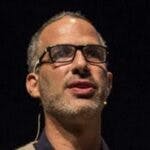Published: 27 November 2019
Last updated: 4 March 2024
Dresden is in the state of Saxony, in eastern Germany, where the Alternative for Germany (AfD) far-right group got 27.5 per cent of the vote in the last federal elections in September this year. In the adjoining state of Thuringia, the AfD received 24 per cent, which was a worse result because no other party can form a coalition without the AfD.
How does this shape the neo-Nazi landscape? Will the dominant Christian Democratic Union (CDU) party form a coalition with the AfD and give it legitimacy? Will the normalisation of the AfD raise the level of violence and lower the level of security for immigrants, Muslims and asylum-seekers?
As an Israeli emigrant, I can tell the Germans some things about the rise of right-wing groups. It seems that Israelis have become used to the presence of the extreme Right and a prime minister who makes racist slurs. Over a decade of extreme right-wing dominance in the Knesset, the political system changed its character and behaviour. Who would have believed that Prime Minister Benjamin Netanyahu would send out, on election day in 2015, thousands of text messages with the following: The Left is bussing Arabs to vote, the Right is in danger!”
In this year’s May election, he continued with this theme: “Israel is not a country of all its citizens”. In the September election he warned on his Facebook page of a left-wing government with “Arabs who want to destroy us all – women, children and men”. Racism became so easy.
But in today’s Germany racism is new and fresh. I hope the country’s political leaders do not make the same mistakes as in the past. Until now, the CDU has boycotted both the radical Left Die Linke and the AfD, even though the Left does not engage in terror or death threats. I hope the CDU does not become like the Likud in Israel and changes its policies towards Die Linke.
The paradox of the CDU
The Thuringia election saw the CDU get a very low vote, just 21.8 per cent, which will force it to partner with either the AfD or Die Linke. If it goes with the AfD, it goes back on its promise to Jewish communities. If it goes with Die Linke, it will alienate conservative voters.
One thing we know from the Israeli experience it that once a party sinks into the abyss of the extreme Right, it is hard to rise back up. In Israel, the Likud’s mindset has become everyday news: hatred of minorities, demonisation of the other, nationalistic isolation, paranoid and obsessive crusade against so-called traitors on the left, the narrowing of the education system, spitting in the face of intellectuals and the media, the demise of democracy, widening the gaps between the underclass and the privileged, and eroding the independence of the media and judiciary.
If the CDU forms a coalition with the AfD, the Dresden state of emergency will become the new normal.
This may seem extreme but the signs have been building over the past few years: the terror attack on the synagogue in Halle, the murder of progressive CDU politician Walter Lübcke, Greens leaders Cem Özdemir and Claudia Roth receiving death threats; and the vigilante “security” patrols popping up in several states.
The AfD will try to change the way Germans remember the Holocaust and the way the country treats immigrants.
German Jewish leaders are now more concerned about the far-right surge in Thuringia than the Muslim minority, who they used to see as a major anti-Semitic threat. People who voted for the AfD in Thuringia "knew exactly what they were doing," says Charlotte Knobloch, the former president of the Central Council of Jews in Germany.
I am worried. I don’t want to live in Germany if the AfD gets legitimitised. I know the Israeli politics that I left. Maybe I must become more active. An AfD conference scheduled in Berlin earlier this year was moved to Poland after German hotels refused to accommodate the delegates. Anti-fascist activists were behind the efforts to block the AfD conference. It is heartening to know there is a genuine resistance toward the entry of the radical right-wing into Berlin.
I wonder, did we ever do this kind of thing in Israel?




